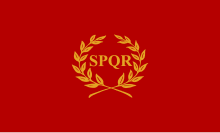Senatus Populusque Novus Romanus | |
 The flag of Nova Roma, based on the colours and symbols of the Roman Republic | |
| Formation | 1998 |
|---|---|
| Type | Nonprofit |
Official language | Latin |
| Website | www.novaroma.org |
Nova Roma (Latin for 'New Rome') is an international[1][2] Roman cultural revivalist and reconstructionist organization created in 1998, later incorporated in Maine (USA) as a non-profit organization with an educational and spiritual mission.[3] Nova Roma is dedicated to promote "the restoration of classical Roman religion, culture, and virtues" and "shared Roman ideals".[4][5]
Notable for providing extensive resources about Roman culture, Latin, ancient Roman costuming and reenactment guidelines,[5][6][7] Nova Roma aims to be more than a community of reenactors or history study group. Based on the reconstructed Roman ceremonies and spiritual aspects of the activities of Nova Roma, Strimska,[8] Davy,[9] Adler,[10] Gallagher-Ashcraft,[11] and Chryssides[12] refer to it as the world's leading Roman reconstructionist community. Because it has a structure based on the ancient Roman Republic,[13] with a senate, magistrates and laws enacted by vote of the comitia,[14] and with its own coinage,[15][16] and because the Nova Roma Wiki states that the group self-identifies as a "sovereign nation", some outside observers[4][16][17][18] classify it as a micronation.
- ^ Palacios, Juan José: "Corporate citizenship and social responsibility in a globalized world". Citizenship Studies 8(4):383-402. Routledge, 2004
- ^ Danese, Roberto/Bacianini, Andrea/Torino, Alessio: Weni, widi, wici: tra 'volumen" e byte. p. 133. Guaraldi, 2003"
- ^ "Interactive Corporative Services Information on Nova Roma". Maine Department of the Secretary of State, Bureau of Corporations, Elections, and Commissions. Archived from the original on 2013-10-17. Retrieved 2007-11-27.
- ^ a b Dixon, Suzanne (2007). Cornelia, Mother of the Gracchi. Routledge. p. 64.
- ^ a b Trinkle, D. A./Merriman, S. A: The history highway: a 21st century guide to Internet resources, p. 464. M.E. Sharpe, 2006
- ^ Burgan, Michael: Empire of Ancient Rome, p. 122. Infobase Publishing, 2004
- ^ "Nova Roma: Organization Dedicated to Ancient Roman Culture". Center for Applied Second Language Studies (CASLS), University of Oregon. 13 November 2011. Archived from the original on 2012-04-26. Retrieved 2011-12-05.
- ^ Strmiska, Michael: Modern Paganism in World Cultures: Comparative Perspectives, p. 335-336. ABC-CLIO, 2005
- ^ Cite error: The named reference
Davy, Barbara Jane page 156, 163, 233was invoked but never defined (see the help page). - ^ Cite error: The named reference
Adler, Margot page 549was invoked but never defined (see the help page). - ^ Eugene V. Gallagher, W. Michael Ashcraft: Introduction to New and Alternative Religions in America: Metaphysical, New Age, and neopagan movements. p. 220. Greenwood Press, 2006
- ^ George D. Chryssides, Historical Dictionary of New Religious Movements (2011, 2nd ed.)
- ^ Auffarth, Chr./Bernard, J./Mohr, H.: Metzler Lexikon Religion: Gegenwart - Alltag - Medien, pp. 211-12. Metzler, 2002
- ^ Danese, Roberto/Bacianini, Andrea/Torino, Alessio: Weni, widi, wici: tra 'volumen" e byte. p. 134. Guaraldi, 2003"
- ^ "Sestertius signum". Archived from the original on 2009-03-22. Retrieved 2009-03-09.
- ^ a b American Numismatic Association: The Numismatist, page 19. American Numismatic Association, 2003
- ^ Caporaso, Giovanni: Cambiare Identitá.: É possibile, ecco le Prove, Offshore World Inc., 2006
- ^ Vobruba, Georg: Grenzsoziologie: die politische Strukturierung des Raumes, p. 210. VS Verlag, 2006